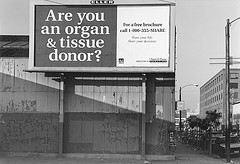Poll: Would You Donate A Kidney For Cash?
Donating a kidney or part of a liver is a risky proposition, even when you’re giving the donation to a loved one or family member. But a new study asks whether or not people would be more willing to part with an organ if tens, or even hundreds, of thousands of dollars were offered.
According to the survey, done by researchers at the University of Pennsylvania, respondents became more and more willing to donate as the money increased. But, contrary to some folks’ expectations, the increase in willingness appears to be steady across all economic classes.
“We were surprised to find that, contrary to what a lot of ethicists were concerned about, people were as able to discern risks in the face of a $100,000 payment as with no payment,” one of the Penn doctors involved in the research explained.
In their report, the Penn researchers claimed, “Theoretical concerns about paying persons for living kidney donation are not corroborated by empirical evidence.”
The study goes so far as to suggest “a real-world test of regulated payments for kidney donation… to definitively show whether payment provides a viable and ethical method” to increase the supply of kidneys.
Some of those who take issue with the study allege that the people who responded positively to the poll were possibly just saying what they thought they ought to say.
“We are seeing a lot of socially desirable answering,” says Lainie Ross of the University of Chicago’s MacLean Center for Clinical Medical Ethics.
Ross also took issue with the survey’s methodology. The polling was done on board commuter trains in the Philadelphia area, and she believes that only talking to these people overlooks “the poorest of the poor,” i.e., those for whom donating an organ would provide the biggest financial boon.
Study: Payments would increase organ donation [Philadelphia Inquirer]
Want more consumer news? Visit our parent organization, Consumer Reports, for the latest on scams, recalls, and other consumer issues.


